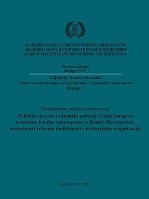LOKALNA SAMOUPRAVA V REPUBLIKI SLOVENIJI S POSEBNIM OBZIROM NA POLOŽAJ GLAVNEGA MESTA
LOCAL SELF-GOVERNMENT IN THE REPUBLIC OF SLOVENIA WITH SPECIAL RESPECT TO THE LOCATION OF THE CAPITAL CITY
Author(s): Franc Grad
Subject(s): Politics, Constitutional Law, Governance, Government/Political systems
Published by: Akademija Nauka i Umjetnosti Bosne i Hercegovine
Keywords: local self-government; constitution; legislation; city municipality; capital city;
Summary/Abstract: Local self-government in Slovenia is comparable to local self-government in other Central European countries. The local self-government system is based on the Constitution of the Republic of Slovenia and the European Charter of Local Self-Government. It is particularly important that the Constitution guarantees local self-government in Slovenia, which cannot therefore be abolished. The legal regulation of local self-government is determined in the legislation, mainly by the Act on Local Self-Government, which systematically regulates local self-government. In addition to it, local self-government is regulated at the systemic level by the Municipal Financing Act and the Local Elections Act, as well as a series of laws that regulate individual areas of social life. The Local Self-Government Act defines the city municipality as a special type of municipality, which also includes the city of Ljubljana, which is defined by the constitution as the capital of the Republic of Slovenia. The legal status of the capital city is specifically determined in the special Act on the Capital City of Slovenia, which determines the position of Ljubljana as the capital. The law primarily determines the special tasks and duties of Ljubljana as the capital of Slovenia, as well as the financial resources that belong to it for the performance of these tasks.
- Page Range: 109-129
- Page Count: 21
- Publication Year: 2022
- Language: Slovenian
- Content File-PDF

